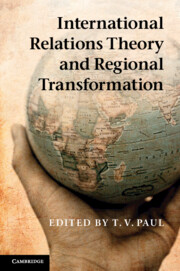Book contents
- Frontmatter
- Contents
- Figures and tables
- About the contributors
- Acknowledgments
- Part 1 Introduction
- Part 2 Realist perspectives
- 3 Realism and Neorealism in the study of regional conflict
- 4 Neoclassical realism and the study of regional order
- Part 3 Liberal perspectives
- Part 4 Constructivist perspectives
- Part 5 Eclectic perspectives
- Part 6 Conclusions
- Index
- References
3 - Realism and Neorealism in the study of regional conflict
Published online by Cambridge University Press: 05 June 2012
- Frontmatter
- Contents
- Figures and tables
- About the contributors
- Acknowledgments
- Part 1 Introduction
- Part 2 Realist perspectives
- 3 Realism and Neorealism in the study of regional conflict
- 4 Neoclassical realism and the study of regional order
- Part 3 Liberal perspectives
- Part 4 Constructivist perspectives
- Part 5 Eclectic perspectives
- Part 6 Conclusions
- Index
- References
Summary
When it comes to the study of regional conflicts, realists as a group have been loath to put forward a clear and generalizable theory. This is not to say that realists have not offered insights into the probability of militarized conflict in particular regions. In the early 1990s, for example, John Mearsheimer and Aaron Friedberg offered well-known and controversial arguments for the likelihood of war in Europe and the Far East based largely on the insights of realist logic. Yet there are few realist scholars who have attempted to derive a theory of conflict that would predict the relative stability of different regions based on an understanding of the power dynamics within these regions, as opposed to simply examining how external great powers might exploit regional politics for their own purposes.
This chapter will sketch the initial outlines of a realist theory that does seek to explain and predict the relative levels of stability across regions, both in historical terms and within the contemporary global system. Drawing on my previous work on major war between great powers, I will attempt to show that the logic of dynamic differentials theory (DDT), a structural realist theory designed to explain major wars at the level of the global great power system, can also be used effectively, with some qualifications, at the level of regional subsystems. Dynamic differentials theory argues that crises and wars are most likely when the most dominant military states in a system begin to anticipate steep and largely inevitable decline and thus start to fear the future intentions of rising actors. As I will discuss, whether these dominant states will initiate preventive attacks or destabilizing crises that might avert their decline will depend on a host of important structural variables, including the polarity of the system (in a regional subsystem, the number of important actors), the offense–defense balance, and the levels of relative economic and potential power. For now, it is important to grasp the essence of the approach: wars and militarized conflicts are driven by the dynamics of the power balance, and profound decline by the leading military state or its nearest rival can destabilize a system to the point of bilateral or subsystem-wide war.
- Type
- Chapter
- Information
- Publisher: Cambridge University PressPrint publication year: 2012
References
- 11
- Cited by



